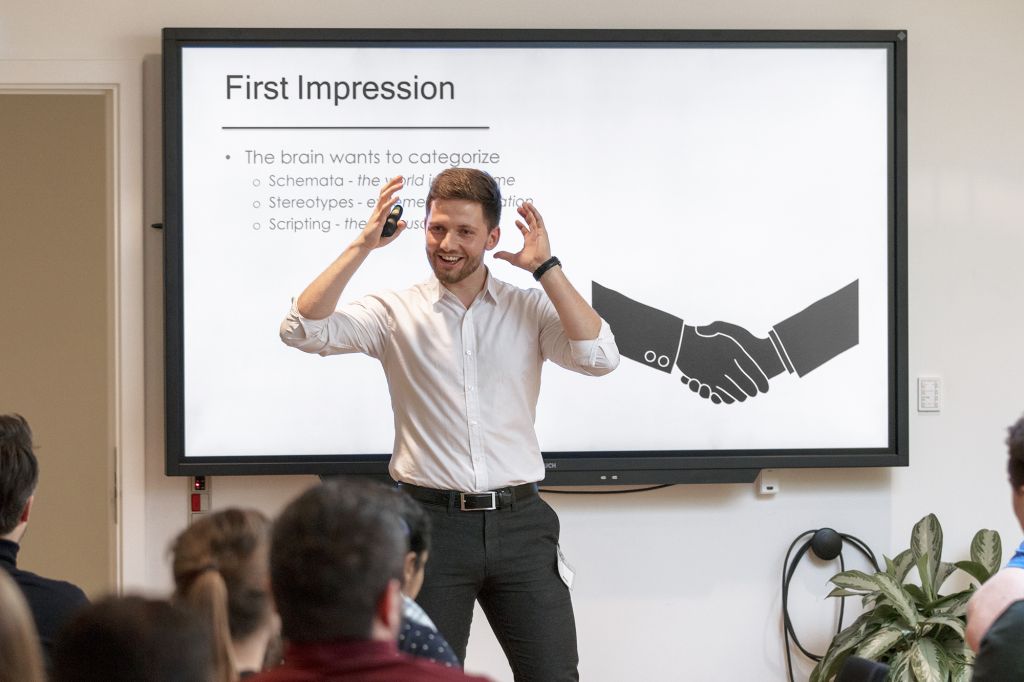HA Psyk. students learn presentation techniques to curb exam stress

Students in their first and third semesters of the BSc in Business Administration and Psychology program will soon be taught presentational techniques to help them communicate their new knowledge during oral exams. The course lecturer, Mathias Bruhn, hopes the techniques will reduce the stress related to oral exams, and offers advice on preparing for them.
Last year, the BSc in Business Administration and Psychology study program (HA. Psyk in Danish), launched ‘grade-free classes’ as an initiative to limit the pressure and stress that students experience when having to perform well.
Now, the study program is ready to launch another initiative to curb student stress: Courses on presentation techniques.
Mathias Bruhn, former student and external lecturer, will be running the sessions on presentation techniques as part of the courses on economic psychology, and occupational and management psychology during the first and third semesters.
“We want to equip the students with the skills they need to perform well and communicate the knowledge they have obtained. I’m not going to teach them what to say, but how to say it,” says Mathias Bruhn.

Mathias Bruhn, external lecturer, is going to teach 300 HA Psyk. students how they can perform better at oral examinations. (Photo: Mathias Bruhn)
In total, 300 students divided between the two courses will attend a three-hour session in November, close to the oral examinations. He explains that the students will be taught how to give a good first impression, introduce themselves, and make a good pitch.
“During the session, we will practice using body language and voices to our advantage, and finally we will discuss what I call the antagonists, for example, stress and nervousness, and how the students can work with them to perform better,” he says.
Presentation skills are useful for more than just oral examinations, argues Mathias Bruhn.
“CBS students possess specialist knowledge, and if you can’t communicate that knowledge, it’s lost. We must improve at communicating the knowledge we have and make it functional. And that’s a skill that students will also need when entering the job market,” he says.
Recreating an oral exam
In order to teach students the skills they need, Mathias Bruhn wants to recreate the feeling of attending an oral exam. Only then can the students learn how to tackle their stress and anxiety, he believes.
“Some of the students will present topics to me as they would in an exam. They must feel the nervousness and the stress so that we can discuss what happens, what they are going through and what we can do to turn the stress and nervousness into something useful,” he says.
For example, Mathias Bruhn suggests that the students make sure they prepare the first 30 seconds of their exams. Knowing that, it’s easier to get a good start, he says.
“If we look at the theory of how the brain reacts to stress and nervousness, it improves our strengths, and highlights our weaknesses. A football player is better at hitting the goal if a crowd is cheering and watching. On the other hand, we close down mentally when faced with new tasks, so by preparing an introduction, yourself and a few topics, you’re off to a better start,” he says.
When Mathias Bruhn talks about teaching presentation skills, he focuses clearly on the first minutes of the exam, because according to him, this is when we lay the foundation for our final result.
“If we look at the 20-second rule, a first impression is made within seven seconds, but a persistent impression is made after 20 seconds. So, if you are not performing at your best within the first 20 seconds, it will take about 20 minutes to change the other person’s mind about you. And that’s not good in an exam situation,” he explains, advising students to begin by shaking hands with the censor and teacher.
Oral exams are easy peasy. Right?
Danish students will have experienced oral exams many times during primary school and high school. So, at least the Danish students should be acquainted with the format of oral exams and know what works and what fails?
Maybe they should, but Mathias Bruhn knows why they lack these skills.
“Students are expected to perform well in oral exams and presentations. But our system doesn’t teach them how. It’s just expected,” says Mathias Bruhn and continues:
“We have so many specialists and people with a passion for learning, but we haven’t taught them how to communicate their knowledge. When we ask students what causes them most stress, it’s not written exams, but oral exams, and maybe we can remove some of that stress.”
The sessions on presentation techniques will run during this academic year as a pilot scheme for BSc in Business Administration and Psychology students.




































































































































Comments